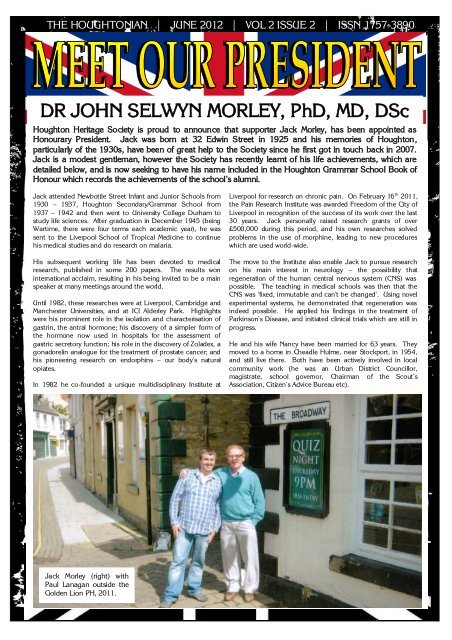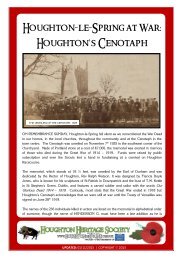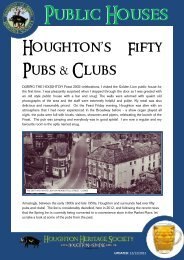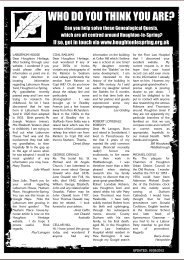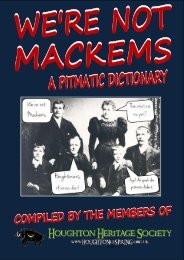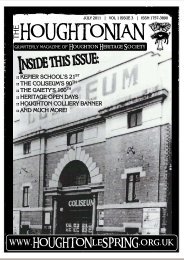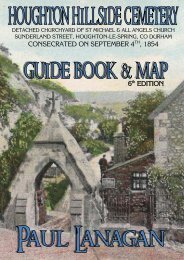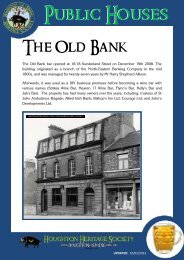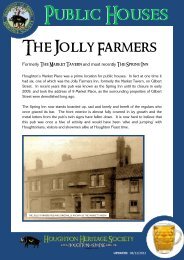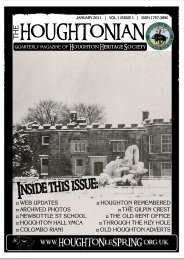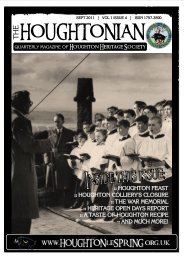THE HOUGHTONIAN | JUNE 2012 | VOL 2 ISSUE 2 | ISSN 1757-3890DR JOHN SELWYN MORLEY, PhD, MD, DSc<strong>Houghton</strong> Heritage Society is proud to announce that supporter Jack Mor<strong>le</strong>y, has been appointed asHonourary President. Jack was born at 32 Edwin Street in 1925 and his memories of <strong>Houghton</strong>,particularly of the 1930s, have been of great help to the Society since he first got in touch back in 2007.Jack is a modest gent<strong>le</strong>man, however the Society has recently <strong>le</strong>arnt of his life achievements, which aredetai<strong>le</strong>d below, and is now seeking to have his name included in the <strong>Houghton</strong> Grammar School Book ofHonour which records the achievements of the school’s alumni.Jack attended Newbott<strong>le</strong> Street Infant and Junior Schools from1930 – 1937, <strong>Houghton</strong> Secondary/Grammar School from1937 – 1942 and then went to University Col<strong>le</strong>ge Durham tostudy life sciences. After graduation in December 1945 (beingWartime, there were four terms each academic year), he wassent to the Liverpool School of Tropical Medicine to continuehis medical studies and do research on malaria.His subsequent working life has been devoted to medicalresearch, published in some 200 papers. The results woninternational acclaim, resulting in his being invited to be a mainspeaker at many meetings around the world.Until 1982, these researches were at Liverpool, Cambridge andManchester Universities, and at ICI Alder<strong>le</strong>y Park. Highlightswere his prominent ro<strong>le</strong> in the isolation and characterisation ofgastrin, the antral hormone; his discovery of a simp<strong>le</strong>r form ofthe hormone now used in hospitals for the assessment ofgastric secretory function; his ro<strong>le</strong> in the discovery of Zoladex, agonadorelin analogue for the treatment of prostate cancer; andhis pioneering research on endorphins – our body’s naturalopiates.In 1982 he co-founded a unique multidisciplinary Institute atLiverpool for research on chronic pain. On February 16 th 2011,Liverpool for research on chronic pain. On February 16 th 2011,the Pain Research Institute was awarded Freedom of the City ofLiverpool in recognition of the success of its work over the last30 years. Jack personally raised research grants of over£500,000 during this period, and his own researches solvedprob<strong>le</strong>ms in the use of morphine, <strong>le</strong>ading to new procedureswhich are used world-wide.The move to the Institute also enab<strong>le</strong> Jack to pursue researchon his main interest in neurology – the possibility thatregeneration of the human central nervous system (CNS) waspossib<strong>le</strong>. The teaching in medical schools was then that theCNS was ‘fixed, immutab<strong>le</strong> and can’t be changed’. Using nove<strong>le</strong>xperimental systems, he demonstrated that regeneration wasindeed possib<strong>le</strong>. He applied his findings in the treatment ofParkinson’s Disease, and initiated clinical trials which are still inprogress.He and his wife Nancy have been married for 63 years. Theymoved to a home in Chead<strong>le</strong> Hulme, near Stockport, in 1954,and still live there. Both have been actively in<strong>vol</strong>ved in localcommunity work (he was an Urban District Councillor,magistrate, school governor, Chairman of the Scout’sAssociation, Citizen’s Advice Bureau etc).Jack Mor<strong>le</strong>y (right) withPaul Lanagan outside theGolden Lion PH, 2011.
THE HOUGHTONIAN | JUNE 2012 | VOL 2 ISSUE 2 | ISSN 1757-3890RITCHEY’S YARDDear <strong>Houghton</strong> Heritage, In oneof the censuses it states that therewas a Ritchey’s Yard which wasbehind Ritchey’s shop in NeshamPlace. Can anyone tell meanything about it?Margaret RitcheyA&M Ritchey’s Good GrubNewbott<strong>le</strong> StreetSIR GEORGE ELLIOTDear Paul, It has been many yearssince we communicated regardingthe life of Sir George Elliot for mybook about Powell Duffryn. I hopeyou are well. P<strong>le</strong>ase can you help?I wish to write to the owner of<strong>Houghton</strong> Hall seeking permissionto use a photograph I took of theirin home in my forthcoming bookabout Powell Duffryn. Thepublisher, Black Dwarf Lightmoor,postponed publication of thePowell Duffryn book in 2008 dueto the economic situation, but lastyear asked me to get ready forlaying out my work this year. Thetask of laying out the book willbegin soon. P<strong>le</strong>ase could you thename of the owner of <strong>Houghton</strong>Hall? Last year, Black Dwarfpublished my first book, 'Vickers'Master Shipbuilder: Sir LeonardRedshaw', and I attach 'MERReview of LR Book.jpg', which is areview of the book in MER (MarineEngineers Review], a journalpublished by IMAREST, formerlythe Institution of MarineEngineers. Best wishesLes ShoreRAINTON PIT DISASTERHi Paul, After some info off the StMichaels Burial register. Have theform here to send to you for 8records of Blackbird's andB<strong>le</strong>nkinsop's but then thought Iam probably related to all of them.Just for your info the main thing Iam trying to work out is if theThomas Blackbird who died in theRainton Pit accident of 1823 is thesame Thomas who is my 4 x GrGrandfather. Cheers.Steven SlaterEDWIN STREET SHOPHello, I have been looking at yourwebsite with great interest. Myfather was born at <strong>Houghton</strong> on 3March 1921 above hisgrandparents' corner shop.Unfortunately I don't know thename of the road but I was takenWHO DO YOU THINK YOU ARE?Can you help solve theseGenealogical & Heritage Quests?father was born at <strong>Houghton</strong> on 3March 1921 above hisgrandparents' corner shop.Unfortunately I don't know thename of the road but I was takenthere in the 1960s by which time ithad been re-converted into ahouse. The names of thegrandparents were Elizabeth andH (Henry?) Davidson. They hadfour children. 1.Herbert whomarried Suzie and they had oneson Tom and two girls Betty andDorothy. Both girls married twobrothers by the name of Fulton.2.Grace who married Tom Lax.They had one daughter Bessiewho was knocked down by a buson 20 January 1939. She wasaged just 9. They also had a sonHarry who continues to live in<strong>Houghton</strong>. I am regular contactwith him and he is trying to obtaina book on the history of <strong>Houghton</strong>which includes a photo of theaforementioned shop with bothgrandparents standing outside!3.Mildred (my grandmother) whomarried Maddison Wilks. They hadtwo boys William Maddison (mydad) and Thomas Davidson.4.They also had a son William. Iknow nothing of him. My mainquestion concerns the <strong>Houghton</strong>Cut. My grandfather used to tellme it had been cut by FrenchPrisoners of War during the mid1800s. Is this correct p<strong>le</strong>ase? Iremember visiting the cemetery offthe cut in the 1960s. What atranquil place it was. He also toldme that some French PoW wereburied there. Is that also correct?Many thanks and keep up thegreat work with your website!Oh yes, and a Happy New Year toyou all.Paul WilksCheshirePAUL LANAGAN REPLIED:There is a photograph in ‘ThePeop<strong>le</strong>'s History: <strong>Houghton</strong>-<strong>le</strong>-<strong>Spring</strong>’ by Geoffrey Berriman,2000, on page 52 showingDavidson's Grocery shop in EdwinStreet, circa 1920. Could this bethe photograph you refer to?FOOTBALL TEAMSHi Paul, Last week I decided togive my grandfather's footballmedal to my grandson. Mydaughter put MonkwearmouthCharity Cup into the Internet andup came a picture of the 1912 cupwinning team,Charity Cup into the Internet andup came a picture of the 1912 cupwinning team, with mygrandfather's picture. I remaintotally gobsmacked! I have founda website that states that the onlyplayer so far identified is thegoalkeeper, Jack Heath. Mygrandfather, Simon Graham isnext to him, on his right, i.e. backrow 4th from <strong>le</strong>ft. I need to findout where Simon was living in1912. My early years memories areSimon and Isabel Graham living at25 Bullion Lane, Chester-<strong>le</strong>-street.They had three children, Mary, mymother, Frank Graham and Ruth.Frank's children Peter and Patriciawere brought up in Pelton/Perkinsvil<strong>le</strong>. I know that Simon'sfather was the landlord of the ShipInn at Pelton, one reason whySimon was teetotal. I am totallyfascinated by the picture, we havenever seen this before. Magic!Kind regards.Alan DolmanDENE HOUSE FARMDear <strong>Houghton</strong> Heritage Society, Iam a descendent from theBowden family that owned DeneHouse Farm at <strong>Houghton</strong>- <strong>le</strong>-<strong>Spring</strong> circa early 1800. We willbe in Durham soon and wouldappreciate the opportunity toresearch the family history. Couldyou direct us to the best locationfor help in this matter? We havethe book The Peop<strong>le</strong>s History<strong>Houghton</strong>-<strong>le</strong>-<strong>Spring</strong> by GeoffreyBerriman; it has a photo of DeneHouse Farm being worked in1954. We would like to know theorigin of the photo and the exactlocation of the Farm. We wouldlike to contact him by email andask if you could provide us with hisaddress and/or contact detailsp<strong>le</strong>ase, if you have them. In fact ifyou have details of any othercontacts that could be ofassistance, thank you if you couldforward to us. Look forward toyour assistance with thanks.Regards.Moira MorettiAdelaide, AustraliaWHOSE CHABBLE?Paul, I am a American womanliving in Sacramento, CA, USA,and own a very old oak diningtab<strong>le</strong> with a label on the undersideof the tab<strong>le</strong> that is quite worn.Some of the writing is worn awaybut I can still read some. Thispiece of furniture came fromtab<strong>le</strong> with a label on the undersideof the tab<strong>le</strong> that is quite worn.Some of the writing is worn awaybut I can still read some. Thispiece of furniture came fromClingly Antiques:-----ery Row Methodist Church,<strong>Houghton</strong>-<strong>le</strong>-<strong>Spring</strong>, England, -----s 2030, Sunderland 75012Can you provide me of anyassistance in determining thisbusiness? The address? Thechurch? I have been fruit<strong>le</strong>sslysearching on the internet and haveyet to find much information.Sincerely.Susan WilkinsonCalifornia, USAPAUL LANAGAN REPLIED:Dear Susan, Thank you for yourenquiry regarding the dining tab<strong>le</strong>.This piece of furniture came fromClingly Antiques. I have not heardof Clingly Antiques before but itappears that it was in Sunderlandbased on the old sty<strong>le</strong> te<strong>le</strong>phonenumber of 75012 - before the 56prefix was added. The tab<strong>le</strong> camefrom Colliery Row MethodistChurch, located in Chilton Moor,near Fence Houses, just outside of<strong>Houghton</strong>-<strong>le</strong>-<strong>Spring</strong> town centre.I would assume it was probablythe communion tab<strong>le</strong> - can yousupply some photos? I don't knowwhat the "-----s 2030" is; if it hadbeen 1830 or 1930 I would haveguessed the date it was donated tothe church. Older locals recol<strong>le</strong>ctthat when the church first closed itwas used for storing antiques, sothey probably sold the items <strong>le</strong>ft inthe church. It is now used for thestorage of building materials. Youcan see the Church on Goog<strong>le</strong>Maps. I do hope this informationis of use to you.SOUND FAMILIAR?Hi Paul, I visited your site todayand noticed the following burialsre<strong>le</strong>vant to my family history:Thomas Forest; Ann Forest;Jacob Forest; Ann Forest; JaneForest; Jane Forest; JohnForester; Jane Forrest; JaneSwai<strong>le</strong>s; Mahala Swails; andRobert Swa<strong>le</strong>s. Kind regards.John ForrestAustralia


